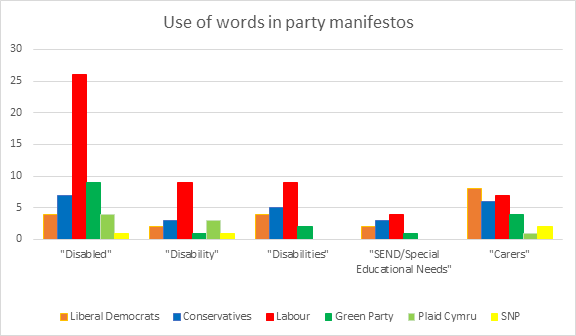How can political parties claim to look out for disabled people when they won’t even make their manifestos accessible?
They must work for everyone if they want to fully cater to their constituents. Ensuring that every eligible voter is informed enough to make a decision would be a start

The general election period means that party campaigns are inescapable, with constant streams of discourse by party leaders and representatives about how they – more so than anyone else – are best to represent you.
The question is, however, are parties doing enough to truly represent everyone?
Considering that 18 per cent of working age adults are disabled, and 21 per cent of all people are disabled, it would not be shocking for one to assume that political parties are making a significant effort to cater to the needs of almost one-fifth of those who are eligible to vote. Sadly, this is not the case.
It is necessary to engage disabled voters through a range of means in order to account for a range of additional needs. Recognising policy needs, acknowledging disabled people and their carers throughout one’s manifesto, and creating accessible manifestos and resources are a few ways in which to do so.
All party manifestos that were assessed refer to disabled people, but all at starkly different rates. An analysis of the amount of times disability was referenced within the manifestos shows a varying dedication to the lives of disabled people across the parties.
The Liberal Democrats fall short out of the three leading parties, with their mentions of disability totalling 20. The Conservatives are in front of the Liberal Democrats: they mention disability in four more instances. In Labour’s manifesto, there is more mention of disability than the Liberal Democrats and the Conservatives combined, with 55 mentions. When looking at the smaller parties, the Green Party makes 18 mentions – and their “easy-read” version was released at the same time as their “mainstream” manifesto. Plaid Cymru do not even make double digits with eight mentions, and the Scottish National Party mention disability four times, as displayed in the graph below.

The sheer inclusion of disabled people is a step in the right direction, with the acknowledgement of existence and a need for directed policy attention being a bare minimum. However, throwing in a few words in regards to those with additional needs and their carers is simply not enough.
Ensuring that disabled people can place a well informed vote is imperative. This is not just a matter of ensuring polling stations are physically accessible but is also done by delivering information in accessible formats. A vital, but often underused, method of doing so is through easy-read manifestos.
Easy-read manifestos include the majority of policy highlights in simplistic language – with political jargon removed – and with photos or illustrations included to aid understanding. In short, the reading age is much lower, the font used is considered dyslexia-friendly, and visual aids are used. Mencap – the charity for people with learning disabilities – has called for all parties to launch easy-read manifestos.
Unfortunately, yet unsurprisingly, very few parties provide manifestos in accessible formats. United Response is currently creating easy-read manifestos for all political parties, but at the time of writing, the Liberal Democrats and the Green Party are the only parties to have published easy-read manifestos online, alongside their full manifestos.
The two parties with the highest quantitative mention of disability – the Conservatives and Labour – have not openly published easy-read manifestos. The Conservative Party’s website does provide access to an audio manifesto, and states that a copy of an easy-read manifesto, or one in braille or large print, could be gained through calling their headquarters or through emailing their general election email. Upon calling the number stated on their website, however, I was informed that email was the only way I would be able to get an easy-read manifesto.
Following that, I contacted the address and made a request for an accessible manifesto, but days later, I am still waiting for a response. While the Labour Party did offer an easy-read manifesto in 2017, as well as a video summary in British sign language, a braille manifesto and a large print manifesto, there is currently no accessible format for the 2019 manifesto.
One can hope that the parties that have not published easy-reads follow the request made by Mencap and publish one.
For parties to ensure they’re fully catering for every constituent, they must work for disabled people. Not just post-election, but by ensuring that every person who is eligible to vote is provided with the information they need to be informed to do so prior to major votes. With Mencap claiming that only one third of people with learning disabilities in the UK vote, it is vital that the parties assist in the democratic mobilisation of this demographic, and include them within their manifestos and their policies, and make sure their resources are accessible to people with a variety of different needs.



Join our commenting forum
Join thought-provoking conversations, follow other Independent readers and see their replies